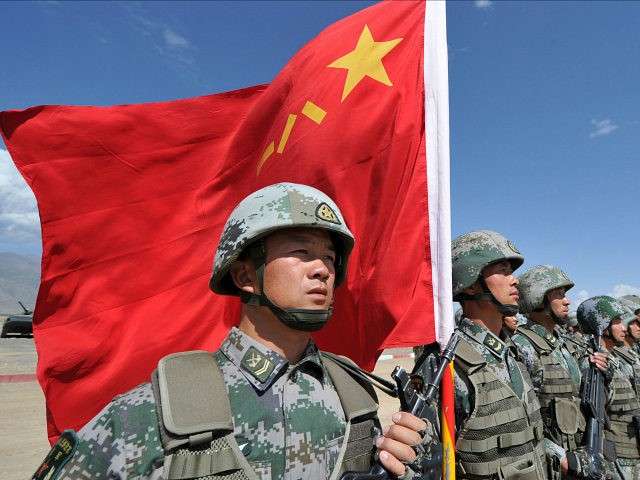The Indian government reached out to China for answers on Monday following the disappearance of five civilian young men in Arunchal Pradesh, an Indian border state China claims as its own “South Tibet.”
New Delhi officials told reporters the Chinese Communist Party has yet to respond to their request for information at press time. During Monday’s regular briefing at the Chinese Foreign Ministry, spokesman Zhao Lijian – a conspiracy theorist who has accused the U.S. Army of causing the Chinese coronavirus pandemic – addressed the matter only to insist that Arunchal Pradesh is not an Indian state.
India’s News18, citing Reuters, identified the five missing men as Toch Singkam, Prasat Ringling, Dongtu Ebiya, Tanu Baker, and Ngaru Diri, and said their families believed that Chinese People’s Liberation Army (PLA) soldiers had illegally crossed into India and abducted them. The men, the family reportedly said, had left with a larger group to go hunting in the dense wooded area near their community. Two of those that went with the hunting party returned unscathed, claiming that they saw members of the PLA drag the men away.
An unnamed member of one of the families of the men involved reportedly posted on Facebook accusing the PLA of causing their disappearance, though the Indian military has yet to directly implicate the Chinese in the incident. Instead, Indian officials told reporters that they had reached out to the PLA seeking information about the men, rather than directly asking for their release. India and China border patrols share a hotline for use in cases where one seeks information on a matter that the other may be helpful.
“The Indian Army has already sent hotline message to the counterpart PLA establishment at the border point in Arunachal Pradesh. Response is awaited,” India’s Minister of State for Minority Affairs Kiren Rijiju said in a Twitter statement on Monday.
A spokesman for the Indian Army, Lieutenant Colonel Harsh Wardhan Pande, told Reuters that the military is treating the incident as an accidental illegal border crossing until they receive more information.
“We spoke with them [Chinese officials] on the hotline and told them that it’s suspected that some people have crossed across to your side and we will be grateful if you could hand them over back, as per what we do normally,” Pande said. “There is no earmarked line going through the forest or the mountains, so they keep moving here and there. So they might have gone there. It’s a very normal thing.”
Indian officials have offered little more information. The Times of India reported, however, that the men had ties to the Indian military, despite being civilians themselves.
“Engaged as porters and guides by the Army, the youths were reported missing by their families through social media on Friday,” the Times of India reported. “The district administration despatched a police team from the headquarters town of Daporijo to Nacho, about 120km north, for an investigation after a Facebook post by the brother of one of the missing youths was shared on Twitter both by Congress MLA Ninong Ering and BJP MP [member of parliament] Tapir Gao.”
China’s Foreign Ministry denied having any knowledge of the incident at all.
“We have no details to release yet about question [sic] on Indian Army sending a message to PLA about the five missing Indians in the region,” Chinese Foreign Ministry spokesman Zhao insisted on Monday.
Zhao took the opportunity to deny the legal existence of Arunchal Pradesh.
“China has never recognized the “so-called ‘Arunachal Pradesh’, which is China’s south Tibet region,” he claimed.
The men’s disappearance occurs a week after the Indian government claimed to have prevented the PLA from establishing an illegal surveillance base on the Indian side of the border in Ladakh, a Himalayan border region. According to New Delhi, the Communist Party was moving hundreds of soldiers to a strategic mountaintop in India over Pangong Tso, a lake with banks on both the Chinese and Indian sides. Indian officials asserted the swiftly removed the PLA troops – who they claimed were carrying tents and surveillance equipment – and set up their own outpost on the mountaintop in question.
The Chinese communist regime reacted with outrage to the incident, claiming that Indian troops had illegally set up an outpost on Chinese territory, the mirror-image accusation of what India said it had prevented China from doing.
Indian publications claimed that the removal of PLA troops resulted in the death of one Indian serviceman: an ethnic Tibetan member of the nation’s Special Frontier Force.
China administers Tibet as an occupied territory, imposing communism and Han ethnic supremacist policies in the area. The erasure of Tibetan Buddhism, Tibetan language, and cultural hallmarks has led to decades of strife in Tibet and a growing exile community in India.
The Pangong Tso incident follows the deadliest exchange between Chinese and Indian troops in nearly half a century, occurring over the Galwan Valley – part of Ladakh – in June. Indian officials said that PLA troops had established an illegal outpost on Indian territory; when confronted about their location, the Chinese troops attacked using rudimentary weapons like rocks and sticks wrapped in barbed wire. The confrontation resulted in 20 Indian soldiers and an unknown number of Chinese casualties. India claims twice as many Chinese troops died as Indians, a claim China denies but refuses to refute with its own numbers.
Indian authorities claimed that their move over Pangong Tso was necessary to prevent a repeat of the Galwan Valley attack.
Follow Frances Martel on Facebook and Twitter.

COMMENTS
Please let us know if you're having issues with commenting.